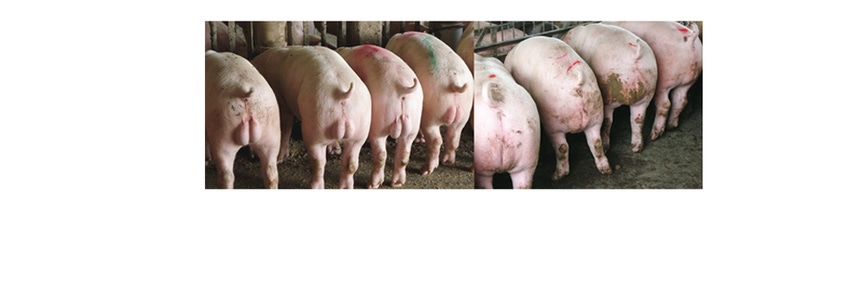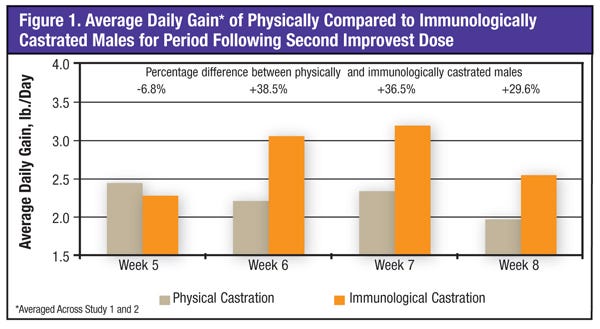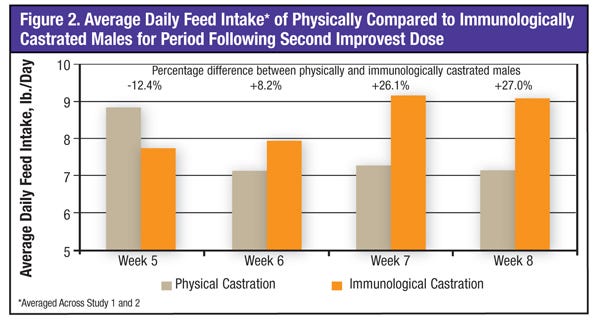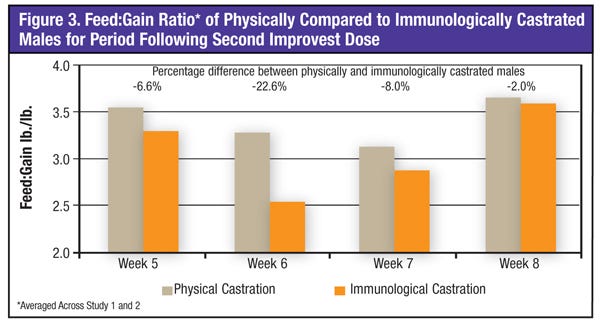It has been widely documented that intact male pigs grow more efficiently and produce leaner carcasses than physically castrated males.
February 15, 2013

It has been widely documented that intact male pigs grow more efficiently and produce leaner carcasses than physically castrated males. However, pigs in the United States are generally marketed at heavier weights than in some countries; therefore, male pigs are castrated at a young age to avoid the aggressiveness, undesirable pregnancies when housed with gilts and the likelihood of boar taint, the characteristically unpleasant odor that is released when meat from intact males is cooked.
See Related Story: "Understanding Improvest."
Two studies at the University of Illinois, conducted in collaboration with Pfizer Animal Health, evaluated the growth performance of immunologically castrated (IC) male pigs using the company’s immunological product, Improvest. This product, when properly administered in two doses, effectively reduces boar taint. The second dose is given in late finishing, thus taking advantage of the growth benefits of intact males while eliminating the risk of producing meat with boar taint.
The studies included 340 crossbred pigs (160 in Study 1, 180 in Study 2) from common commercial genetic lines. Both studies were carried out on pigs from 16 weeks of age (~150 lb. live weight) over the final eight weeks of the finishing period to a harvest weight of about 285 lb. IC-male performance was compared to physically castrated (PC) males, intact males (Study 1 only) and gilts. In Study 2, ractopamine was fed at levels of 0, 4.5 or 6.75 grams/ton during the final 21 days of the study period.
Similar procedures were used in both studies. The first Improvest dose was given at the start of the study (16 weeks of age), followed by a second dose four weeks later. Pigs were housed in pens of four in a finishing building providing 12.4 sq. ft. of space per pig. Diets were formulated to meet or exceed the nutrient requirements of intact males fed ractopamine at the highest level (6.75 grams/ton).
Relative differences between the genders (presented as the percentage difference from physically castrated males) were relatively similar in both studies (Table 1). Over the eight-week study period, IC males grew faster than PC males, intact males and gilts, which grew the slowest. IC males’ feed intake was similar to PC males, but their feed conversion was better.

In the second study, feeding ractopamine increased growth rate and improved feed efficiency in all pigs regardless of treatment, which agreed with other studies designed to evaluate response to the product.
Of particular interest were the differences in growth rate, feed intake and feed efficiency for IC males relative to PC males in the period following the second Improvest dose. Changes in these three performance measures averaged across the two studies are presented in Figures 1, 2 and 3.



In the first week following the second dose (Week 5 of study), IC males grew slower and consumed less feed than PC males. However, from the sixth week (two weeks after second injection) onward, the IC males grew faster, consumed more feed and converted it more efficiently than their PC counterparts.
“Over the final eight weeks of the finishing period, immunologically castrated males had 10% to 15% improved feed efficiency compared to physically castrated males,” notes University of Illinois researcher Mike Ellis. “In addition, feeding ractopamine improved growth performance to a similar extent in all genders and suggests that the increases in growth performance due to Improvest and ractopamine are additive.”
Researchers: Michael Ellis, Chris Puls and Floyd McKeith, University of Illinois, Urbana, IL; and Aubrey Schroeder, Pfizer Animal Health. Contact Ellis by phone (217) 333-6455 or email [email protected].
You might also like:
You May Also Like



